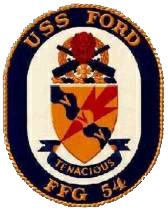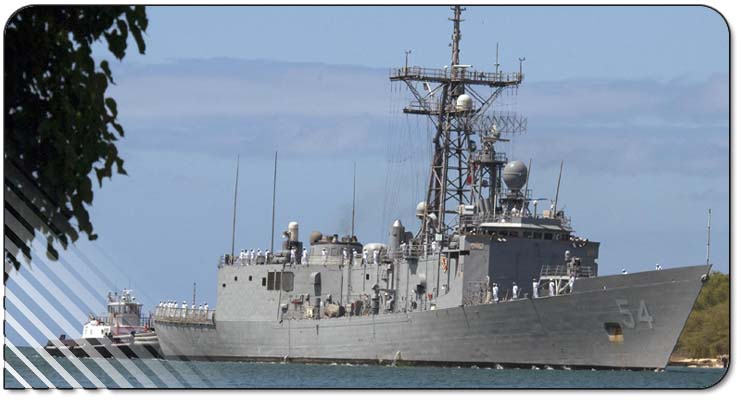Namesake:
Gunner’s Mate Guns Second Class
(GMG2) Patrick Osborne Ford
Patrick Osborne Ford was born in San Francisco, California, on 2 May
1942. At the age of 15, he moved to Phoenix, Arizona, where he attended
Camelback and North High School.
Shortly after graduation, Ford enlisted in the Navy. He completed basic
training at the Naval Training Center, San Diego, California, and
received orders to report to the Naval Station, Adak, Alaska. He
reported aboard the destroyer USS JAMES E. KYES (DD 787) where he
served as a Gunner's Mate until the end of his enlistment in 1963.
Petty Officer Ford reenlisted in 1965 and served at the Naval Station,
Long Beach, California. In 1966, he was transferred to the Naval
Support Activity, Danang, Republic of Vietnam, where he was ordered to
report aboard the USS GEORGE K. MACKENZIE (DD 836). Following
completion of his tour aboard MACKENZIE, Ford was subsequently
transferred to the USS HENDERSON (DD 785) where he remained until the
end of his second enlistment in 1967.
Later that year Ford reenlisted for the second time at the Naval
Receiving Station, San Francisco, California. He was ordered to the
Naval Amphibious Base, Coronado, California for River Patrol Craft
Training. Following completion of training in 1968, Petty Officer Ford
was directed to report to the Naval Support Activity, Saigon, Republic
of Vietnam. He was assigned to Task Force 116, River Squadron 5, in
1968.
For the next five months, he served as a patrol river boat sailor,
monitoring the traffic of the many rivers and coastal waterways of the
area. On 21 June 1968, Petty Officer Ford was serving as the after
machine-gunner aboard Patrol River Boat 750 as part of a two-boat
patrol operating in the upper My Tho River near the town of Cai Be. The
boats were maneuvering down the river when they spotted a sampan
fleeing into a nearby canal. The two patrol boats gave chase and
captured the sampan one hundred meters further up the canal. As the
patrol boat returned to the river with the captured sampan in tow, it
was ambushed by a Viet Cong patrol that unleashed an overwhelming
barrage of heavy machine-gun fire and rockets.
Two explosive B-40 rockets struck Ford's boat, immediately killing the
patrol leader and coxswain. Within seconds, the boat was ablaze and out
of control, heading directly for the Viet Cong positions. Even as the
boat was hit by four additional rockets, and after suffering serious
injuries, Ford tenaciously maintained a steady volume of return fire
from his aft machine-gunner's station. In the face of enemy gunfire and
with his clothing on fire, Ford assisted three seriously wounded
shipmates into the water. Only after ensuring that all the surviving
crew had left the boat did Ford make his way into the water. He was the
last man alive to leave what remained of Patrol River Boat 750.
Soon after Petty Officer Ford entered the water, he was killed by a
burst of enemy machine-gun fire. However, as a result of his fearless
devotion to duty, he saved the lives of two of his shipmates. For his
"extraordinary heroism" and in keeping with the highest traditions of
the United States Navy, Petty Officer Ford was posthumously awarded the
Navy Cross.
|
Ship's Crest:
 Description
of Coat of Arms:
The coat of arms for USS FORD has much symbolism in its design. The
predominant colors of dark blue and gold are traditionally associated
with the Navy; blue to represent the sea and gold to signify
excellence. Description
of Coat of Arms:
The coat of arms for USS FORD has much symbolism in its design. The
predominant colors of dark blue and gold are traditionally associated
with the Navy; blue to represent the sea and gold to signify
excellence.
The various designs on the shield depict the heroic naval career of
Second Class Gunner's Mate Patrick Osborne Ford, who gave his life for
fellow sailors and country. The colors yellow and scarlet allude to the
flag of South Vietnam. The wavy blue band symbolizes the My Tho River,
site of the battle in which Petty Officer Ford gave his life to save
several of his shipmates aboard Patrol River Boat 750. The Roman
numerals 'V' identify the attachment of this vessel to River Squadron
Five. The scarlet spearhead issuing from the left, or sinister, side of
the shield is indicative of the ambush attack by Viet Cong forces on
Patrol River Boat 750. The scarlet color of the central figure depicts
the result of the attack where hostile rockets set the craft ablaze.
The scarlet lion's head is symbolic of the courage and self-sacrifice
exhibited by Petty Officer Ford. The crossed naval cannons represent
his rating as a Gunner's Mate. The inverted laurel signifies the tragic
end of the story. The cross below center denotes the posthumous award
of the Navy Cross.
At the bottom of the shield is the ship's motto, "TENACIOUS". It
describes the manner in which Petty Officer Ford returned fire from his
station aboard the patrol boat as well as the commitment of USS FORD to
its assigned mission.
|

